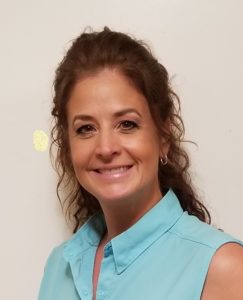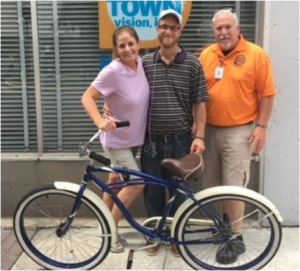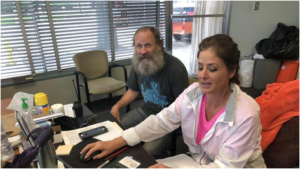
When meeting Cynthia “Cindy” Ray, the first thing you might notice is her bright, kind eyes and genuine smile. She is a people-person to her core and has an innate way of making a complete stranger feel like an old friend in just a few moments. Her voice is clear with a slight Boston accent that gets stronger when she is speaking to something she is passionate or excited about. For Cindy, there’s nothing more exciting than the work she does every day in the heart of Downtown Jacksonville.
Cindy is the Social Services Outreach Specialist enlisted by Downtown Vision’s Clean and Safe Ambassador Program. She has spent her career in service to others, starting off as a Licensed Mental Health Counselor with her own private practice in Daytona Beach, and serving for ten years on the Board of Directors for a homeless outreach nonprofit in the Daytona area. After a few years pursuing ministry work with her spouse in Oregon, they came to Florida and settled in Jacksonville. Cindy was working as a therapist in the Crisis Stabilisation Unit of a correctional facility when she saw an opportunity to join the Ambassador Program, which dovetailed her mental health counseling background with her faith and love of serving and supporting the community.
When she first began her current position, most of her day was spent introducing herself to and establishing relationships with homeless and transient individuals in Downtown’s 90-block Business Improvement District. She emphasizes that credibility and rapport with the individuals she serves are vital to both her and their success in pursuing the goal of the Ambassador Program: to connect homeless and transient individuals with social services providers and resources to improve their circumstance. She proclaims with sparkling eyes and a bit of a laugh: “there is no such thing as a typical day, really.”

Cindy’s priority with most of the homeless and transient individuals she meets is to get them somewhere to stay as soon as possible. “If they need housing and those services; my primary goal is to get them to Quest and the Housing Authority.” Quest is an outreach program run by the Florida Mental Health Resource Center to “assist individuals who are homeless with finding and obtaining housing,” and the Jacksonville Housing Authority spearheads “a variety of programs to fit the needs of low and moderate income families, senior and handicapped adults in the greater Jacksonville, Florida area”
The data supports this approach. According to the Substance Abuse and Mental Health Services Administration — “SAMHSA,” an agency under the U.S. Department of Health and Human Services — “[s]table housing provides the foundation upon which people build their lives. Without a safe, affordable place to live, it is almost impossible to achieve good health or to achieve one’s full potential” (SAMHSA, 2017). The Quest Program not only seeks to ensure individuals have a place to live, but it also matches individuals with the types of accommodation that best suit their specific needs, as well as prioritizes those who have the greatest need and highest vulnerability to get into housing as quickly as possible.
Cindy traverses the streets of the Business Improvement District, notebook in hand, a friendly smile on her face, checking the progress of the individuals she has been working with, as well as greeting new faces, learning their stories, and determining their specific needs. On her rounds, she notes the time of day, the areas of her encounters, and captures demographic information so she can more efficiently reach the greatest amount of homeless and transient individuals as possible. She’s currently the only Social Services Outreach Specialist, but she’s optimistic the program will expand and grow with continued community support. “Having more outreach on the ground is a critical piece of the solution.”
There is already a host of support from various organizations in and around Jacksonville. The Jacksonville Transportation Authority has donated two wheelchair-accessible vans to the program that allow Cindy to transport individuals to social service appointments in a safe and timely way. Cindy also works closely with other Ambassadors, leveraging their knowledge of the areas she should focus on and individuals they have seen who look like they could use her help.
Not every homeless or transient individual needs significant intervention or assistance. Many times, all a person needs is a little boost of confidence from someone who cares, and that’s something Cindy is enthusiastic to offer. “There is a feeling of hopelessness, like ‘this is just the way it is.’ One of my biggest goals is just to encourage people that their situation can change. It doesn’t have to be this way.”
Cindy doesn’t keep regular office hours, but individuals needing assistance can book appointments with her in order to find out what resources are out there and get help filing for assistance. Scheduling an appointment can help individuals avoid save time waiting in line. During those appointments, she can help with overcoming some of the barriers that individuals encounter while attempting to access resources. “If somebody doesn’t have a cell phone, or don’t have access to the Internet, or even know how to use the Internet, they can’t access a lot of great resources.” Cindy has access to the technology they need in order to file paperwork. This kind of approach allows people to advocate for themselves, take a proactive approach to their circumstances, and empowers them as individuals.

Cindy also spoke about some of the stigmas and misinformation that surrounds homelessness. “The homeless population really care for one another. They watch each other’s backs, for the most part. The sense of belonging is big out there; they think: ‘these people over here are in the same boat I am, they can relate to me.’ We all need that sense of connection and belonging. In fact, they fear for their lives, too, on the street. A lot of times they say: ‘I’m afraid of being out here … I’m not the one hurting anybody.’”
Cindy was also emphatic about offering individuals longer-term assistance than just giving them food or money directly. “If someone is panhandling, please don’t give money. There are a lot of places that will feed people — the Sulzbacher Center is one. So I would ask people to direct the person to services instead, to try to connect them to services instead of giving money.” It’s another way to empower individuals to take the initiative to help themselves and make positive, constructive choices that will pay off both in the short and the long term.
The final thoughts Cindy wanted to share about the community she works so closely with and spends the majority of her waking hours advocating for came slowly, carefully, but no less passionately than she had been speaking the rest of the morning. “Not everybody on the street is dangerous. They have a lack of choice and direction. Pray for people. Volunteer where you can at organizations that are helping. If you want to help in some way, go to wherever you feel drawn that’s trying to help homeless and transient individuals. Advocate, be a voice, wherever you see that to be.”
Cindy Ray
Social Services Outreach Specialist
646.689.2661
cray@blockbyblock.com